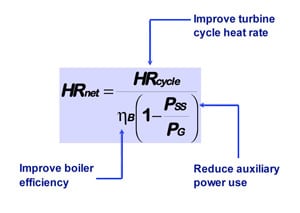COAL POWER Direct
-
O&M
Respect Your Refractory
Because refractory is out of sight inside the gas flow path of a steam generator and its auxiliaries, it’s also often out of mind. That is, until the refractory fails and causes a forced outage.
-
O&M
Power 101: Improving the Performance of Boiler Auxiliaries, Part III
Efficient boiler operation requires boiler auxiliary equipment to operate in harmony. In this third and last installment of our Power 101 series, we examine ways to decrease the auxiliary power requirements of boiler auxiliaries.
-
Coal
House Panel Hustles Through Bill Blocking EPA Climate Rules
In an anti-climactic markup that featured little new debate and no amendments by opposing Democrats, the House Energy and Power Subcommittee approved Republican legislation to block Obama administration action on climate change by stripping the Environmental Protection Agency of its Clean Air Act authority to regulate carbon dioxide and other greenhouse gases.
-
Coal
EPA Requiring Three Oklahoma Coal Plants to Scrub or Use Gas
In an unusual ultimatum, the Environmental Protection Agency said that it is proposing to take over visibility portions of the Oklahoma Clean Air Act implementation plan to require three coal-fired power plants in the state either to switch to natural gas or install sulfur dioxide scrubbers within three years.
-
Coal
Air Rules Could Risk 11% of PJM Generation
Anticipated clean air regulations could force the retirement of as much as 19,000 MW of coal capacity in the Mid-Atlantic—or 11% of the region’s generation—unless power prices rise to levels that make operation of the plants profitable, according to the independent market monitor for PJM Interconnection.
-
O&M
Clinker Minimization at San Miguel Electric Co-Op
San Miguel Electric Cooperative selected and installed an automatic sootblowing system for its Unit 1 to minimize clinkers in the boiler that caused semi-annual unscheduled outages. New boiler surface-cleaning equipment and intelligent cleaning software eliminated these expensive outages.
-
Commentary
State of the Union: Recycling a Failed Energy Policy
President Obama’s Jan. 25th State of the Union address proposed that the nation commit itself to developing "clean energy" sources of electricity over the next two decades. A critical assessment of his proposal finds that it’s just a rehash of previously rejected legislative proposals. In fact, to me, it sounds like Waxman-Markey all over again. I have a better idea.
-
Coal
Duke, Progress Energy Merging into Biggest U.S. Power Utility
Duke Energy and Progress Energy announced January 10 that they are combining to create the nation’s biggest electric utility. The $13.7 billion deal is likely to draw tough scrutiny from federal and state regulators—and some protests from big power buyers—given the companies’ overwhelming market dominance in North Carolina and more modest operational overlap in South Carolina.
-
Coal
Coal Groups Blast Colorado’s Dash to Natural Gas
In a decision blasted by the coal industry as making the state "dangerously reliant" on natural gas, the Colorado Public Utilities Commission has approved an emissions-reduction plan for Xcel Energy that further expands the utility’s already extensive shutdown of coal-fired power plants in favor of gas-fueled generation.
-
Coal
Illinois Lawmakers Block Clean Coal Plant
Ringing what may be the death knell for the $3.5 billion Taylorville IGCC project, the Illinois Senate voted 33-18 in early January against authorizing construction of a coal gasification and power generating plant proposed in the state by Tenaska.



